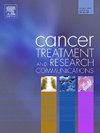253号直肠癌患者淋巴结转移相关因素分析
IF 2.4
Q3 Medicine
引用次数: 0
摘要
目的淋巴结转移是结直肠癌的原发转移,探讨结直肠癌患者淋巴结转移的特点及潜在影响因素,对指导治疗、改善患者预后具有积极意义。方法回顾性分析2017年10月至2022年10月青岛大学附属医院行根治性直肠癌(D3)切除术的760例直肠癌(D3)患者的临床资料。结果760例患者中淋巴结阳性314例,其中253号淋巴结阳性26例。单因素分析显示,CEA水平、肿瘤T分期、肿瘤N分期、转移淋巴结数量、血管肿瘤血栓形成是253号直肠癌淋巴结转移的危险因素。多因素分析显示,CEA水平(CEA>5 ng/ml)、转移淋巴结数、血管癌血栓形成是直肠癌No.253淋巴结转移的独立危险因素。结论CEA水平高、肿瘤TNM分期晚、淋巴结转移数量多、血管血栓阳性的直肠癌患者253淋巴结转移风险高。CEA水平(CEA>5 ng/ml)、淋巴结转移数、血管癌血栓形成是直肠癌No.253淋巴结转移的独立危险因素。本文章由计算机程序翻译,如有差异,请以英文原文为准。
Analysis of the relevant factors of lymph node metastasis in No.253 lymph node of rectal cancer patients
Objective
Lymph node metastasis is the primary metastasis of colorectal cancer, and it is of positive significance to explore the characteristics and potential influencing factors of lymph node metastasis in colorectal cancer patients to guide the treatment and improve the prognosis of patients.
Method
The clinical data of 760 patients with rectal cancer (D3) who underwent radical rectal cancer (D3) resection in the Affiliated Hospital of Qingdao University from October 2017 to October 2022 were retrospectively analysed.
Result
Among the 760 patients, 314 was lymph node-positive, of which 26 was positive for the No.253 lymph node. Univariate analysis showed that CEA level, tumor T stage, tumor N stage, number of lymph nodes metastasised, and vascular tumor thrombus were risk factors for lymph node metastasis in No.253 lymph node of rectal cancer. Multivariate analysis showed that CEA level (CEA>5 ng/ml), number of lymph nodes metastasised, and vascular cancer thrombus were independent risk factors for lymph node metastasis in No.253 lymph node of rectal cancer patients.
Conclusion
The risk of lymph node metastasis in No.253 lymph node was higher in rectal cancer patients with high CEA levels, late tumor TNM stage, number of lymph node metastases, and positive vascular thrombus. CEA level (CEA>5 ng/ml), number of lymph nodes metastasised, and vascular cancer thrombus were independent risk factors for lymph node metastasis in No.253 lymph node of rectal cancer patients.
求助全文
通过发布文献求助,成功后即可免费获取论文全文。
去求助
来源期刊

Cancer treatment and research communications
Medicine-Oncology
CiteScore
4.30
自引率
0.00%
发文量
148
审稿时长
56 days
期刊介绍:
Cancer Treatment and Research Communications is an international peer-reviewed publication dedicated to providing comprehensive basic, translational, and clinical oncology research. The journal is devoted to articles on detection, diagnosis, prevention, policy, and treatment of cancer and provides a global forum for the nurturing and development of future generations of oncology scientists. Cancer Treatment and Research Communications publishes comprehensive reviews and original studies describing various aspects of basic through clinical research of all tumor types. The journal also accepts clinical studies in oncology, with an emphasis on prospective early phase clinical trials. Specific areas of interest include basic, translational, and clinical research and mechanistic approaches; cancer biology; molecular carcinogenesis; genetics and genomics; stem cell and developmental biology; immunology; molecular and cellular oncology; systems biology; drug sensitivity and resistance; gene and antisense therapy; pathology, markers, and prognostic indicators; chemoprevention strategies; multimodality therapy; cancer policy; and integration of various approaches. Our mission is to be the premier source of relevant information through promoting excellence in research and facilitating the timely translation of that science to health care and clinical practice.
 求助内容:
求助内容: 应助结果提醒方式:
应助结果提醒方式:


